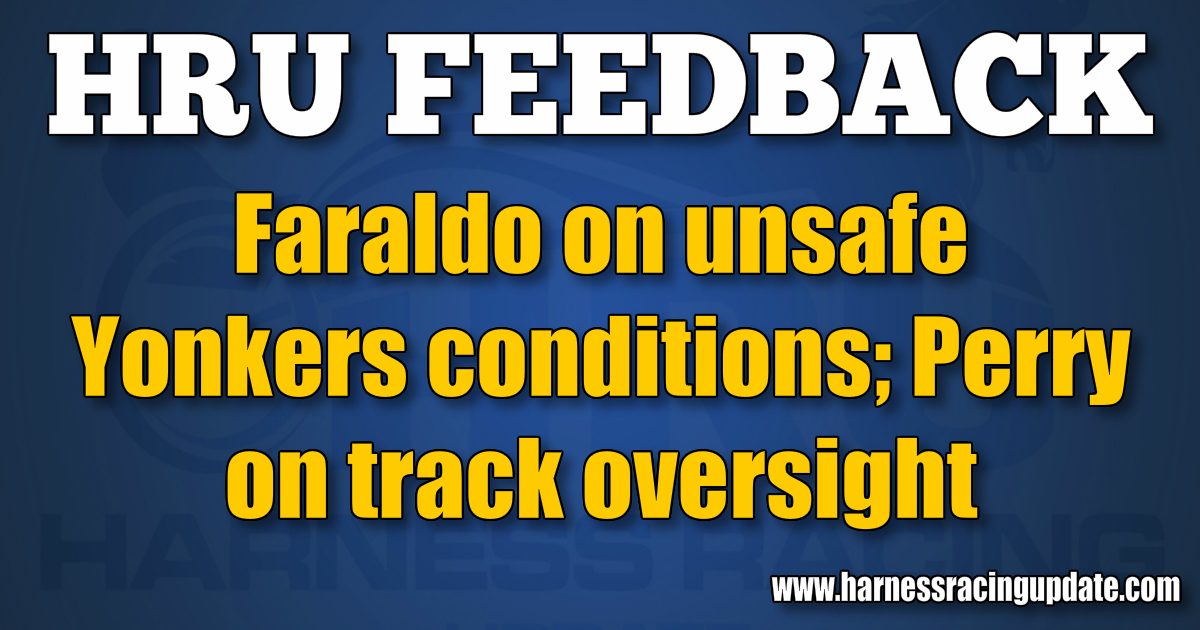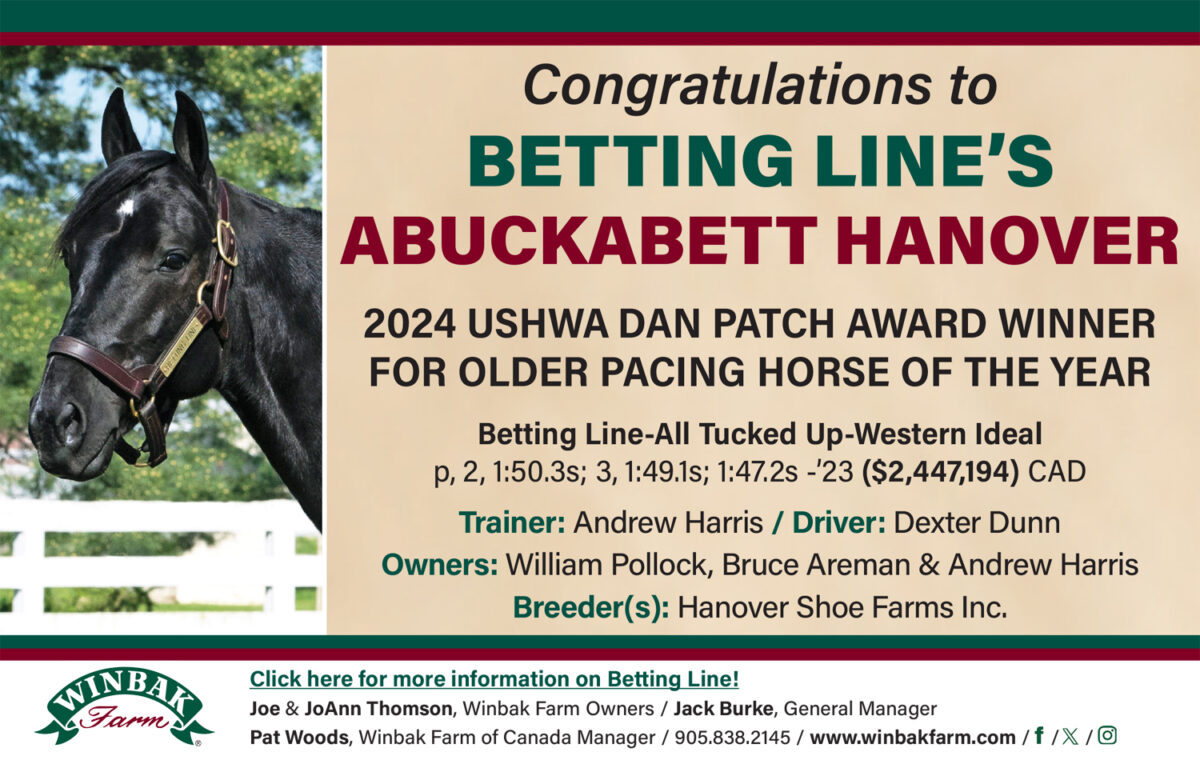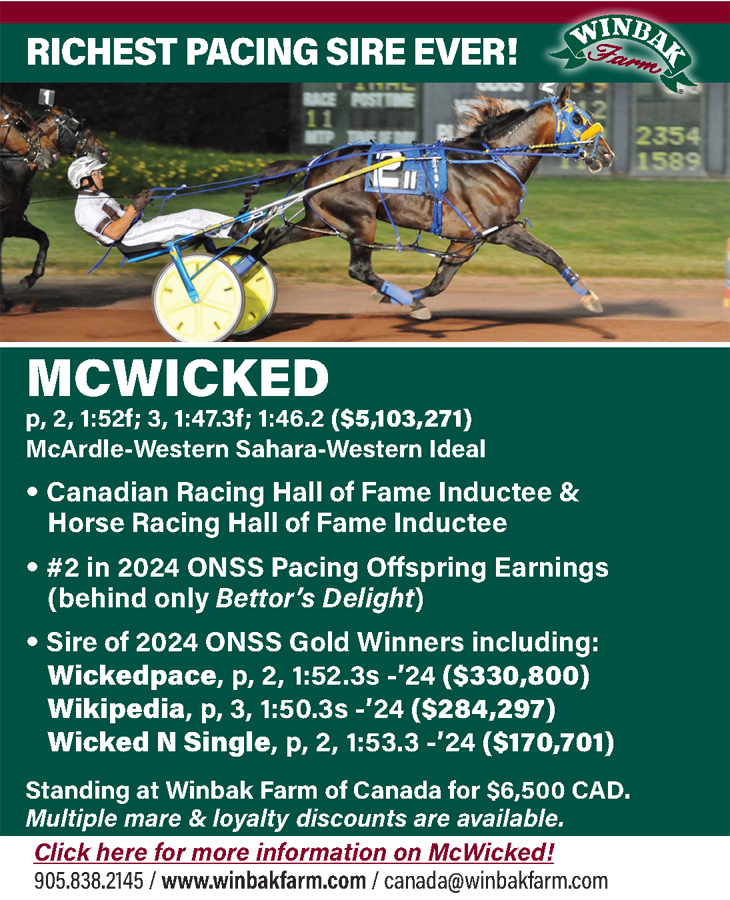
HRU Feedback (2020-12-20)
Faraldo letter about unsafe Yonkers track conditions
The following is a letter Standardbred Owners Association of New York president Joe Faraldo sent to members of the New York State Gaming Commission on the evening of Friday, Dec. 18 and shared with HRU and others.
Gentlemen,
Let me not waste any more time further warning you about the lack of proper maintenance and the resulting track conditions at Yonkers. Your response can be whatever you wish, but the truth is this cannot be further tolerated with a horse breaking its leg slipping on ice tonight.
A horse that was fine going into tonight’s races slipped on the ice and shattered a leg or ankle and was put down. This is not assumption of risk this is the ugliest face of negligence and its horrible consequences. The GC (Gaming Commission) has seemed to tolerate the total disregard for the safe conduct of racing conducted under the auspices of MGM Resorts and its racing management team. There has been no concern about racing, stabling, track conditions or any other daily obligations associated with the racing license MGM Resorts holds.
One has to think that the failure to penalize them for failing to meet the obligations of their license is somehow condoned by this commission. MGM Resorts repeatedly gets away with endangering the health and welfare of the horses and horsemen and destroying the industry.
The track has never been worse, and it will not get better with this current management.
If MGM’s idea is to destroy racing then that goal is being accomplished by the commission or omissions occasioned by the intentional malfeasance of this racing management.
If the idea is to cancel racing dates by intentional malfeasance then the current management team will succeed unless they are required to make up the days canceled as a result of their own malfeasance until it is corrected. The failure to have maintenance crews working, deleting shifts etc. has consequences, not only to the more favorable bottom line of MGM but to the welfare of our horses.
A hired competent track man needs to have experience in keeping a racetrack safe all year not just during July or solely with experience while operating a training center.
From the horsemen on site tonight came these notes:
“On top of the track being terrible, the horsemen’s parking lot was barely plowed, making it unsafe for people walking their horses off the trailers. Besides that, no snow fence was put up this year in the infield. In addition, the top of the up ramp was covered with ice inviting further disaster.”
A horse snapping its leg, which demonstrated no prior lameness, is a disgusting thing to be asked to risk tolerating. The stated concerns for the welfare of the horse, voiced publicly, gives the impression that the welfare of the horse is paramount in NYS but that is belied by the apparent acceptance of MGM’s statements that it shares those concerns and is doing everything to secure the safety of the horses. Nothing can be further from the truth. Acceptance of such assurances by MGM Resorts without more is totally to disregard industry standards and sans the proper policing of the licensee, allowing for a predictable disaster to occur.
There is nothing worse than what was permitted to occur tonight in view of all the things and warning signs leading up to it.
— Joe Faraldo, president SOA of NY
Is there really track oversight for operations integrity?
“Without questions, answers and transparency there can be no expectation of Integrity”
So maybe it’s time to look at the way tracks do or do not ensure that the public is receiving an honest shake in the product their being fed.
1. Exactly what is the rule regarding cache dumping prior to actual start of the races? If I bet a horse that’s 3-5 and 15 seconds after the race’s start the horse drops to 1-9 and the truth surfaces that the reason the 1-9 odds came after the off is that the track held that cache dump so as to encourage more betting at an unreal 3-5 level, why hasn’t the Gaming Commission caught this, and do they even have an IT department to deal with this type of manipulation? It would seem that dragging post times feed into this problem. As an engineer, I know that if I were in in charge of bet-related programming I would install algorithms that predict reasonable payouts on wagers with deviations and patterns that would automatically be sent to the Gaming Commission.
2. Why do the racing officials still remain silent when parked drivers are allowed to get into a hole created by other drivers? That type of action may make you a “one of the guys” with other drivers it is clearly against the rules. And yet the tracks and judges are silent.
3. More and more it seems the tracks are shutting off feedback on actions taken or not taken during racing. In order for the customer to let go of his hard-earned dollars it is absolutely essential that they know the track’s judges are doing more that drinking coffee and eating donuts while they’re on-the-job. If a favorite on the odds board backs up through the field without being either significantly parked or closing during the final quarter, it is up to the judges to investigate not only the performance but the pre-race vet examination and trainer reports. Once the investigation is completed, it is up to the track to post the findings. Since racehorses are athletes similar to other sports, why has this industry passed the buck? If an NFL quarterback has a finger sprain on his throwing hand, this information is provided in a pre-game report, or a big-league pitcher has a groin issue, it’s reported. With this kind of knowledge you have options on who and how to bet. Now, compare those scenarios with the current product in horse racing where we get ZERO feedback on either actions taken or not. In years past, performance reversals were taken very seriously, unlike today where I can’t remember the last time a driver was questioned after suspiciously weak drive. When was the last time you saw a horse switched to Lasix with and accompanying message as to why or if the track vet concurred and the track approved? I think never.
4. Misinterpretations. Apparently, those in charge of insuring track integrity are thrilled with the fact that, with many, their competing sports are at issue due to the COVID-19 virus placing their sport as one of the main remaining options. Actually, what is happening is just the opposite. We now have a lot more time to scrutinize the overall quality of the product AND the problems, poor calls and inconsistent rules. Track announcers seem almost giddy with the amount of longshots winning or placing. Naivete at its finest. Racing fans spend hours handicapping so a “mysterious” change in form in either the favorites or their longshot competitors with no assurances or explanation from track officials doesn’t go very far in assuring us that the game is overseen and fair.
In closing, I believe that relying on current track oversight measures is similar to allowing the police to investigate themselves for wrong-doing. How’s that been working for us?
— David Perry / Dearborn, MI












